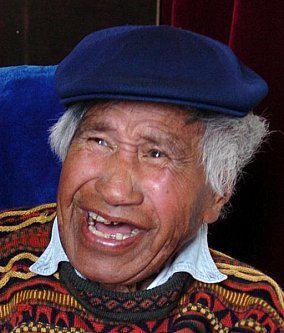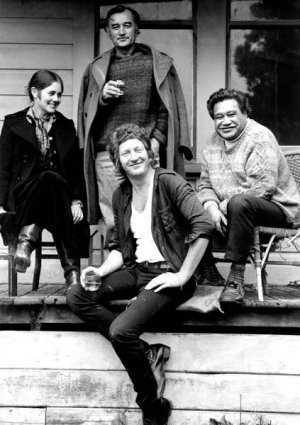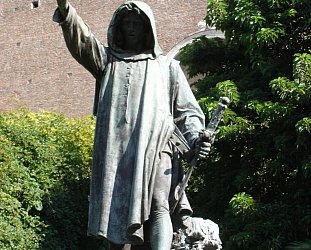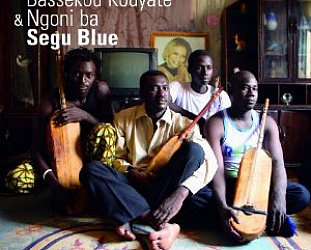Graham Reid | | 4 min read

The Tuwhare project – the album and performances in celebration of the late poet Hone Tuwhare – acknowledged not just the art but the artist.
As Wellington musician Charlotte Yates -- who was commissioned to realise the project -- reminds us, Tuwhare’s first language was Maori until he was 10, and he was the first Maori to publish a book of poetry in English.
That book, No Ordinary Sun published in 1964, has long been considered a cornerstone of New Zealand writing and remains one of the best selling books of poetry in the country.
As Elizabeth Caffin noted in The Oxford History of New Zealand Literature in English: “It’s powerful lyric quality, notably in short poems of nostalgia, regret or grief in Tuwhare’s verse was unusual, and drew its solidity and confidence from the oral strengths of the two communities to which he belonged -- the Maori, and the working class.”
“And schools are still all over it like a rash,” laughs Yates who first saw Tuwhare when he came to her high school to read.
 “I was 16 and I thought poetry sucked
to be honest. I was a surly 6th former dragged along -- there was
him, and Sam Hunt, Jan Kemp and Alistair Campbell. But something
sticks. And when I started researching the Tuwhare project you could
see it in early reviews by people like James K Baxter who recognised
this was an extraordinary voice.
“I was 16 and I thought poetry sucked
to be honest. I was a surly 6th former dragged along -- there was
him, and Sam Hunt, Jan Kemp and Alistair Campbell. But something
sticks. And when I started researching the Tuwhare project you could
see it in early reviews by people like James K Baxter who recognised
this was an extraordinary voice.
“Hone was 42 when No Ordinary Sun came out, so it wasn’t some kid bleating. That was a breakthrough book and heralded an avalanche of a dozen anthologies and a performance career.
“Not to belittle his heritage, but the fact is he was a very outward looking person: a boilermaker, interested in the communist party, he spent a lot of time overseas, interested in lots of things really.
“I met him when he was 81 and he was still interested in word play. Just great fun.”
Yates was approached Toi Maori Aotearoa to undertake a tribute to Tuwhare similar to how she had previously invited musicians to perform the poetry of James K Baxter for an album.
She was mindful of any number of issues, not the least that she was Pakeha, and she didn’t want to “just do the sequel like Jaws 2”. And initially the committee wanted exclusively Maori artists performing the poems.
For her part Yates wanted to meet with Tuwhare to get a sense of what he thought so arrived at his home in the South Island with her guitar, a bottle of wine, and a copy of the Baxter album.
“I had a wonderful couple of days at his place in 2004. I took him the Baxter album but his hearing was munted so we listened to it at the loudest volume, I thought my ears would bleed.
“He grabbed a CD of my last album off me and read the tracks as if they were a poem. You realise then that won’t know that you are, but you are in the presence of a master. It is electrifying.
“The word icon is bandied about a lot, but he’s got it.”
With the committee’s support and Tuwhare’s permission -- ‘He said, ‘You set these things free and if they want to change a word or two that’s okay’ then he stuffed the contract behind a picture in his crib“ -- Yates began approaching musicians who would be sympathetic to the work.
Some had doubts about turning poems into lyrics, one admitted she didn’t know who Tuwhare was, but Dean Hapeta of Upper Hutt Posse (who performs at Te Kupu) summed up the feelings of many when he said of Tuwhare, “I’m standing at the foot of a mountain.”
“The trick,” says Yates, “is to get a poet who has enough work that people can find a poem that suits them, and that they can also make into a song. It is another task again to set it to music.”
Four people chose the poem Rain (Don McLashan ended up with it), and among the line-up of musicians are Hinemoana Baker, Golden Horse, Dallas Tamaira of Fat Freddy’s Drop, Mahinarangi Tocker, Graham Brazier and Yates herself.
From an album the project became a live show which premiered at the New Zealand International Festival of the Arts in March 2006 to enthusiastic reviews and audience response.
Yates notes that as much as honouring Tuwhare, it allowed the performers a chance to mingle and co-operate in a way their lives don’t usually permit.
 Musicians tend to meet in competitive
situations, she says, such as industry events or awards shows.
Tuwhare was not about egos or their own music, but stepping back to
let the poet be in the centre of the frame.
Musicians tend to meet in competitive
situations, she says, such as industry events or awards shows.
Tuwhare was not about egos or their own music, but stepping back to
let the poet be in the centre of the frame.
“His publisher came to the show when it was performed in the International Festival last year and enjoyed the show so much he came along the next day with the new anthology of Hone’s writing and gave one to everyone in the cast and crew.
“Everybody got their copies signed by each other. It was funny but a real fillup for people."
For Yates, who has lived with this for more than two years, it is again time for reflection on the rare opportunity she was given and the extraordinary, and still productive, man whose life and work she has been immersed in.
“I don’t care if I do nothing else in my life, this was me having two days with someone I didn’t know very well -- but it was nothing about me, or the media, or the business which I am constantly involved in.
“It was about Hone Tuwhare and his poetry -- and really cool fun.”





post a comment